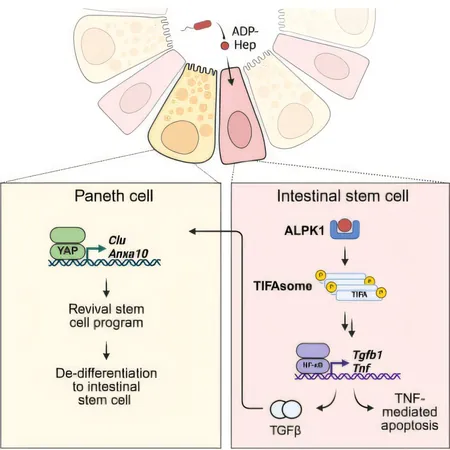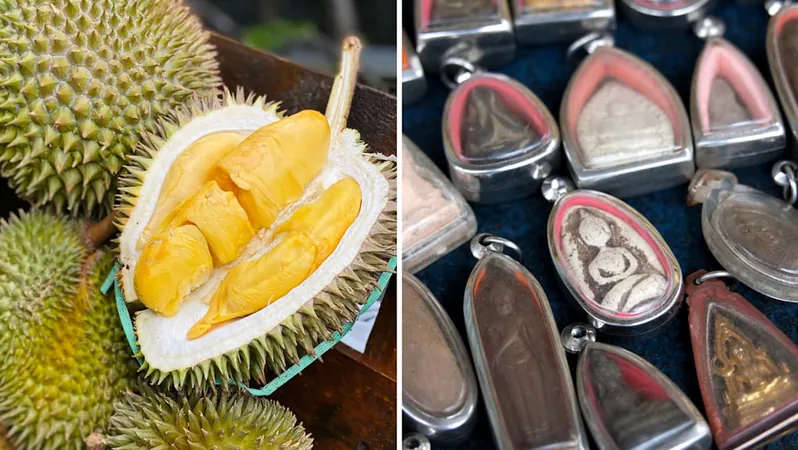
Bacteria's Surprising Role in Healing Our Gut: A New Study Reveals All!
2025-09-22
Author: Wei Ling
Groundbreaking Discovery: Bacteria and Stem Cells Unite!
In a stunning revelation, researchers from the University of Toronto have found that bacteria can actually ignite stem cell regeneration in the intestines to heal injuries. This groundbreaking research highlights an unexpected yet crucial role of our gut microbiome, suggesting it plays a significant part in maintaining human health.
The Microbiome Mystique: More Than Meets the Eye!
Traditionally, it was believed that gut microbes didn’t affect stem cell activities under normal, healthy conditions. However, Ph.D. student Shawn Goyal and his supervisor, Professor Stephen Girardin, delved deeper, uncovering the microbiome’s potential to enhance stem cell function during times of intestinal trauma and repair.
The Implications Are Huge: A Link to Cancer and Disease!
Published in the prestigious journal Cell Stem Cell, their findings hold significant implications for our understanding of colorectal cancer and inflammatory bowel disease. Stem cells, often termed the body’s repair crew, can not only replicate themselves but also transform into various other cell types needed for organ and tissue restoration.
How Your Gut Fights Back: The Intestinal Barrier Explained!
Every day, our bodies endure wear and tear, necessitating continuous tissue regeneration. In the intestines, specialized stem cells replace the intestinal lining every few days, serving as a crucial barrier against harmful microbes and toxins while selectively absorbing nutrients.
A Double-Edged Sword: The Role of Bacteria!
The researchers found that certain bacteria-produced sugars, specifically ADP-heptose, activated a signaling pathway that led to the self-destruction of some intestinal stem cells. While this might sound detrimental, it actually has a protective purpose, preventing damaged cells from causing further harm.
Rebirth Among the Cells: The Power of Revival!
ADP-heptose didn’t just endanger stem cells; it also initiated a regeneration process. This triggered Paneth cells, a specialized type of intestinal cell, to revert to a stem-cell state, effectively replenishing the lost stem cells and restoring the intestinal barrier.
A Protective Mechanism: Could This Prevent Cancer?
The researchers propose that this mechanism proactively replaces damaged stem cells with healthy ones, thereby maintaining the integrity of the intestinal lining and potentially averting mutations that could lead to serious issues like colorectal cancer.
The Future Awaits: What’s Next?
Professor Girardin is eager to explore whether this microbiome-induced protective mechanism might play a role in cancer prevention and how antiviral defenses could similarly maintain intestinal health. Thanks to the germ-free research facilities at Temerty Medicine, this groundbreaking work continues to push the boundaries of our understanding of gut health.




 Brasil (PT)
Brasil (PT)
 Canada (EN)
Canada (EN)
 Chile (ES)
Chile (ES)
 Česko (CS)
Česko (CS)
 대한민국 (KO)
대한민국 (KO)
 España (ES)
España (ES)
 France (FR)
France (FR)
 Hong Kong (EN)
Hong Kong (EN)
 Italia (IT)
Italia (IT)
 日本 (JA)
日本 (JA)
 Magyarország (HU)
Magyarország (HU)
 Norge (NO)
Norge (NO)
 Polska (PL)
Polska (PL)
 Schweiz (DE)
Schweiz (DE)
 Singapore (EN)
Singapore (EN)
 Sverige (SV)
Sverige (SV)
 Suomi (FI)
Suomi (FI)
 Türkiye (TR)
Türkiye (TR)
 الإمارات العربية المتحدة (AR)
الإمارات العربية المتحدة (AR)